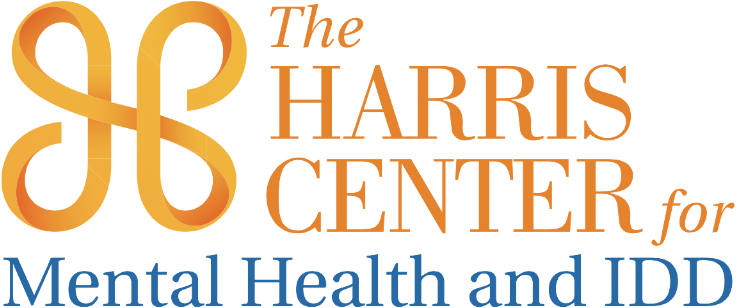THE HARRIS CENTER FOR MENTAL HEALTH AND IDD NOTICE OF PRIVACY PRACTICES
THIS NOTICE DESCRIBES HOW MEDICAL INFORMATION ABOUT YOU MAY BE USED AND DISCLOSED AND HOW YOU CAN GET ACCESS TO THIS INFORMATION. PLEASE REVIEW IT CAREFULLY.
Understanding Your Health Record/Information
When you seek or receive services through The Harris Center for Mental Health and IDD (The Harris Center), we create and obtain health and personal information about you that we keep in an electronic and paper medical record. We understand that your health information is private. We are required by law to maintain the privacy and security of your health information.
This notice explains how The Harris Center may use and disclose your information in verbal, electronic, and paper formats. It also explains your rights and the legal duties we have regarding your information. This applies to your medical records at The Harris Center.
Your Health Information Rights
- You have the right to inspect and obtain an electronic or paper copy of your health information, with a few limited exceptions to include denial of access to your PHI when a licensed professional has determined that access is reasonably likely to endanger your life or physical safety, or that of another person. You may request to have the denial reviewed. If you are denied access, we will notify you of the reason. You will be notified in writing if The Harris Center denies you access to any portion of your medical record because we determine that the release of that portion of your clinical records would be harmful to your physical, mental or emotional health.
- You have the right to amend information you think is wrong or incomplete. We may add the information and make a note that the information is from you. You must explain why you believe the correction should be made. If we are unable to make the correction, we will let you know why in writing.
- You have the right to ask The Harris Center to limit the use or disclosure of your health information for treatment, payment, or our health care operations. We do not have to agree to the limits, but if we do agree, we will do as you ask. If you pay for a service or health care item out-of-pocket in full, you may ask us not to share that information for the purpose of payment or our health care operations with your health insurer. We are required to agree with this request unless a law requires us to share that information.
- You have a right to receive confidential communications of your health information. You have the right to ask that the Harris Center contact or communicate with you by means of the address, email, or telephone number you specify. The Harris Center must agree with all reasonable requests from you to receive communications of your health information by an alternate means or at an alternate location. We may not deny your request if the reason for your request is to prevent harm to you.
- With your written consent, you have a right to permit us to share your health information with another person involved in your case, such as a family member or a closefriend. Youhave a right to give us verbal permission to disclose your health information to a publicor private entity authorized by law or by its charge to assist in disaster relief efforts. If you are not available,we may share your health information if, in our professional judgment, we determine that it is in your best interest. At any time during a state of disaster, we may disclose or use your health information if we believe the other person or entity has a legitimate need for the information. When sharing information to disaster relief organizations, it is unnecessary to obtain your permission if doing so would interfere with our ability to respond to the emergency.
- You have the right to revoke your written permission for The Harris Center to disclose your health information. The revocations will not affect any actions taken before the receipt of the written revocation.
- You have the right to request a restriction on certain uses and disclosures of your protected health information.
- You have the right to an accounting of disclosures we have made of your health information that we are legally permitted to disclose and that were made six years prior to the date you ask for the list of disclosures. We will include all disclosures except for disclosures made for the purposes of:
- Treatment, payment, and health care operations.
- To you about disclosures made to yourself.
- Incident to a use or disclosure otherwise permitted or required by law and regulations.
- Pursuant to a valid authorization.
- For national security or intelligence purposes.
- To correctional institutions or law enforcement officials.
- As part of a limited data set; or
- That occurred before April 14, 2003.
- You have a right to opt out of receiving fundraising communications.
- You have the right to ask for and receive a copy of this notice in both electronic and paper formats.
- Disclosures may be made to a plan sponsor by a health plan, health insurer, or HMO, however, a health plan is prohibited from using or disclosing PHI that is genetic information of an individual for underwriting purposes.
- You must ask The Harris Center in writing if you want to access, amend, revoke an authorization, restrict, communicate with us in a special way, or have an accounting of disclosure of your health information. The Harris Center reserves the right to deny your request to restrict the disclosure of your protected health information to a health plan except in the following cases: (1) The disclosure is for the purpose of carrying out payment or health care operations and is not otherwise required by law; and (2) The protected health information pertains solely to a health care item or service for which the individual, or person other than the health plan on behalf of the individual, has paid The Harris Center entity in full.
The Harris Center's Responsibilities
- The Harris Center is required by law to maintain the privacy and security of your health information and to give you notice of our legal duties and privacy practices with respect to your health information.
- We are required to notify you in writing of any breach of your unsecured protected health information.
- We are required to follow the terms of this notice or any use and/or disclosure limits.
- We will notify you if we are unable to agree to a limitation you request.
- We may use, disclose, or ask for only the information about you that is needed to accomplish a specific purpose.
- We reserve the right to change the terms of this notice and make new notice provisions effective for all PHI that we maintain. If our privacy practices change, we will revise this notice and make it available for you at all clinic and service sites and by way of The Harris Center’s website.
- The Harris Center will retain copies of NPPs issued, written acknowledgments, and good faith efforts to obtain acknowledgments for a minimum of six years.
Chemical Dependency Information
We may only disclose information involving chemical dependency without your permission: by subpoena and court order; for medical emergency; to qualified persons for research, audit, or program evaluation; to report suspected child abuse or neglect; or Disability Rights Texas and/or the Texas Department of Family and Protective Services (DFPS).
Examples of Use and Disclosure for Treatment, Payment, and Agency Operations
The Harris Center may use your health information to provide treatment to you, to bill and receive payment, or for our own health care operations, as permitted by law. The Harris Center is a community- based service provider that receives referrals from the Texas Health and Human Services delivery system; we may share health record information with other facilities, local authorities, and community centers within that system, as well as their respective contract providers without your permission.
The Harris Center may use your health information for your treatment:
We can use our health information to provide, coordinate, or manage health care or related services. This includes providing care to you, consulting with another health care provider about you, and referring you to another health care provider. We can also use your information to prescribe medications for you. We may also disclose your health information to medical personnel if you should need emergency or crisis care.
The Harris Center may use your health information for payment:
We may use your health information to obtain payment for providing care to you or to provide benefits to you under a health plan such as Medicaid. We can use your information to bill your insurance company for care provided to you. Any information provided by you may be subject to verification through matching programs.
The Harris Center may use your health information for regular agency operation:
We may use the information in your health record to assess the care and outcomes in your case and others like it. This information may be used to improve the coordination of care and services we provide.
Permitted Disclosures without Your Written Permission
The Harris Center may use and disclose your health information as allowed by privacy regulations and laws. Some examples include, but are not limited to, the following:
- When required by law; we may use or disclose your information as required by state or federal law. This may include disclosure to you, your legal representative, or to any other person or entity authorized under the law to receive such information.
- To report suspected child abuse or neglect: we may disclose your health information to a government authority to report child abuse or neglect.
- To a government authority if we think you are a victim of abuse: The Harris Center may disclose your PHI to report abuse, neglect, and domestic violence to authorities authorized to receive such disclosures.
- For law enforcement purposes or to law enforcement officials: Your PHI may be disclosed to law enforcement officials under certain circumstances when we are required by law to do so. We may disclose your information to law enforcement if we determine there is a probability of imminent physical injury by you to yourself or others or there is a probability of immediate mental or emotional injury to you. We may disclose your health information to law enforcement if we receive a court order or a subpoena.
- To Correctional Institutions: we may disclose your information to designated persons or personnel of a correctional facility in which you are detained if the disclosure is for the sole purpose of providing treatment and health care to the person in custody.
- To Disability Rights Texas: we may disclose your information to Disability Rights Texas to carry out its protection and advocacy functions permitted by law. For example, we may disclose your health information to Disability Rights Texas to investigate a complaint by you or on your behalf.
- For research: The Harris Center may use and disclose PHI with authorization or without authorization when an institutional review board or privacy board approves a waiver of authorization for reviews preparatory to research and research on decedent information.
- For public health and health oversight activities: we may disclose your information when we are required to collect information about disease or injury, for public health investigations, to report vital statistics, or to determine eligibility for public benefits.
- For Workers compensation: we may disclose your information to comply with laws relating to workers compensation and similar programs.
- To address a serious threat to health or safety: The Harris Center may disclose PHI to anyone who is able to lessen the threat when the disclosure is necessary to prevent or lessen a serious and imminent threat to the health or safety of a person and the public.
- For specialized government functions: we may disclose your personal health information for special government functions such as military, national security and presidential protective services.
- To medical examiner or coroner: In addition to funeral directors, The Harris Center may disclose PHI to medical examiners and coroners as necessary to carry out their duties.
- If you are receiving IDD services: we may give health information about your current physical and mental condition to your parent, guardian, relative, or friend, unless a licensed professional determines such disclosure is likely to harm you or another person.
- In judicial and administrative proceedings: we may disclose your information in any criminal or civil proceeding with a subpoena, courtorder or administrative judge orders us to disclose it.
- For emergency purposes or incapacity: we may share your information with a family member or other person when, in exercising professional judgment, we determine that doing so would be in your best interest if there is an emergency or you are incapacitated.
- For fundraising: If applicable, The Harris Center must get your written authorization if we share your protected health information for fundraising purposes, except the agency may use or share the following health information with a business associate or to an institutionally related foundation:
- Demographic information relating to an individual, including name, address, other contact information, age, gender, and date of birth; and
- Dates of health care provided to an individual;
- Department of service information;
- Treating physician;
- Health outcome information; and
- Health insurance information
The Harris Center may contact you to raise funds for the Harris Center Foundation. You may elect to opt out of receiving fundraising communications without incurring an undue burden or more than a nominal cost for deciding to opt out.
Disclosures not Permitted without Your Written Permission
The Harris Center cannot share your health information unless you give us written permission in the following cases (or in the case of any disclosures not listed in this document):
- Marketing purposes, with the exception of: (1) A face-to-face communication made by a covered entity to an individual; or (2) A promotional gift of nominal value provided by the covered entity.
- Sale of your protected health information
- Sharing of Psychotherapy Notes - The Harris Center does not create or maintain psychotherapy notes.
Other uses and disclosures not described in this notice will be made only with your written authorization. You have the right to revoke a written authorization at any time.
To File a Complaint
If you believe your privacy rights have been violated, you can file a complaint by contacting:
- The Harris Center’s Consumer Rights Protection Officer at (713) 970-7211.
- U.S. Department of Health and Human Services, Office for Civil Rights, 200 Independence Ave., S.W.,Suite 515 F, HHH Building, Washington, D.C. 20201, (800) 368-1019
- TX Dept. of State Health Service, Office of Consumer Rights, (800) 252-8154, P.O. Box 12668, Austin, Texas 78711; or
- Texas Office of the Attorney General, P.O. Box 12548, Austin, TX 78711-2548 or https://texasattorneygeneral.gov/cpd/file-a-consumer-complaint or (800) 621-0508.
- Substance Abuse facility Investigation (MC E-249), Texas Department of State Health Services, P.O. Box 149030, Austin,Texas78714-9030, Complaint Hotline (800) 458-9858 option 6
Your complaint must be filed within 180 days of the time you came to believe your privacy rights were violated. The Harris Center may not retaliate against you for filing a complaint. If you would like additional information, you may contact The Harris Center’s Privacy Officer at (713) 970-7339.




